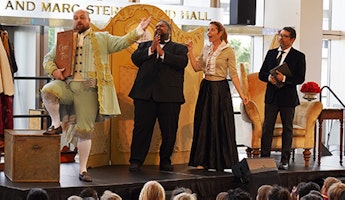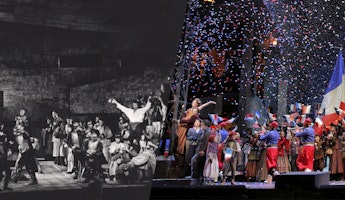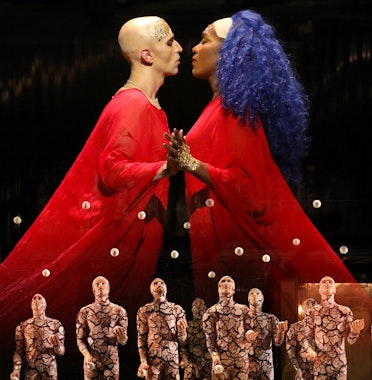Blog
September 15, 2022
Looking Through the Glass
By guest blogger Danielle Hayden
Friedrich Heinrich Kern has captured audiences around the world for decades as a virtuoso of the glass harmonica, a unique instrument unforgettably featured at the climax of Lucia di Lammermoor, as Lucia falls into madness. (It operates on the same principal as rubbing a wet finger on the rim of a wine glass.) An 18th-century invention credited to Benjamin Franklin, the glass harmonica was rumored to have driven listeners to madness and players to lead poisoning. Though both of those theories have since been largely disproven, what did remain was a rich musical legacy that has endured through the ages.
Although Kern has visited concert halls in cities across the globe, this is his first time performing in Los Angeles. LA Opera caught up with Kern to hear some of his musical musings, his latest ventures and what people can look forward to this fall as he makes his company debut playing the glass harmonica as a vital piece of Donzetti's Lucia di Lammermoor.
What do you love about the acoustical qualities of the glass harmonica?
Every instrument is different. My main instrument is piano, and I play a few other instruments like organ and trombone. But if you compare it with more conventional instruments, I would say that with the glass harmonica, there's a less directional quality of the acoustics. I think people also usually associate the sound of playing musical glasses with a sort of atmospheric, ethereal quality, and I think that has to do with the fact that the directional quality of the acoustics is less pronounced than in others. That may be the most unique feature of the instrument, in terms of acoustics.
Could you tell us a bit of history about the glass harmonica?
The original instrument is a bit different than the instrument that I'm performing with here at LA Opera. This is a fantastic new instrument, a more modern version. It's a new construction by a German builder, Sascha Reckert, and it has a very carrying sound, which is particularly helpful when I perform with contemporary, modern orchestra instruments, like in the opera. So this has a lot of advantages.
The historical glass harmonica is a little bit different in terms of build. The biggest difference is that it had a horizontal design versus this [modern] vertical design where you have, in principle, a simple set of vertical glass tubes. The other benefit of this instrument is that because I control the pressure of the glass tubes with the simple rubbing mechanism like you would do on a wine glass, you have a lot more dynamic freedom. You have a lot of freedom of expression with this instrument, because you can control it yourself. There's no motor, there are no mechanics involved, just natural direct sound here, which I love. With the traditional glass harmonica, you always have the mechanics of either the motor or your feet if you don't play an electric model.
It has different qualities, different modes of expression, but in terms of flexibility, this is really my instrument of choice at the moment. So that's maybe the uniqueness of this modern version. Some call it a “verrophone,” but you can also call it a modern glass harmonica. I'm a pianist by training but we play on entirely different pianos than we did 150 years ago, right? So that's why I'm saying usually people are more familiar with the term “glass harmonica" and that's totally fine to use it for this instrument.
People are always very curious about the instrument, and they ask a lot of questions. When you're a pianist, nobody asks you “Oh, how do you play a piano?"
How will the glass harmonica be used in LA Opera’s production of Lucia di Lammermoor?
Lucia di Lammermoor is a unique case, as I'm performing basically at the climax of the opera, the mad scene. It's a very long scene and it's very well written because it builds up considerably. It's almost like I can warm up within the scene.
It has a slow beginning and then it becomes more virtuosic and more technically demanding as it moves toward the cadenza, the climax of the opera and also of course my personal highlight. My performance is between 20 and 30 minutes.
LA Opera is fantastic. They've been very nice here and I'm very excited. I've never played in L.A., so this is really exciting. On a personal note, I've played Lucia many, many times, but I haven't gotten tired of it and still enjoy it. It's always a different experience with a different ensemble. Some singers use different cadenzas. They always perform a little differently. I played this production in New York. I wish I had the chance to see it, but it's behind me on the stage, so I never have the chance to see it myself in person. I probably will never have the chance! This new production is exciting and I'm very much looking forward to it.
How were you first introduced to the glass harmonica? What led you to begin learning this instrument?
I performed at a concert and started networking with a builder and performer of these instruments. He heard me play in a completely unrelated concert and asked me if I wanted to collaborate. I was in my early twenties, so this was about 20 years ago. I started to collaborate with him on some projects and I started playing myself; I was very curious about it. And I'd like to imagine that my piano practice helped a little bit with playing this instrument also, at least with the motoric qualities. So it really was a natural collaboration, serendipity, and I have played ever since. I took a few years off to be more involved in my academic work. But at the bottom of my heart, I'm a performer. I love performing. I perform a lot in the United States. I'm still based here and there are not many players here. I love coming to different parts of the country.
How does the environment you are performing in affect the sound of the glass harmonica?
This is another benefit of working with this builder. When we started collaborating, he built these instruments with a unique construction that I can take apart. I can completely remove these tubes from the frame. When I travel, I fly with a tube case next to me. I have an extra seat on the airplane, and then the frame can usually go in cargo. Then once I get to my destination, it usually takes half a day to get it back together. It's a bit tricky. It's a bit unique. The problem is always that you have to get it through security, because they want to be helpful and push it through the scanner and it's like, "Let me do it myself!"
There are a lot of practical questions in terms of performing in opera, questions like finding a way to clean my hands before the show.
I've been playing this instrument for a long time now; experience tremendously helps with this. It's a very different experience than playing the piano. I used to practice piano six hours a day. But with this instrument you have different challenges, like how your fingers react to it. And the water quality has a huge impact on it.
It's always a challenge to play in different places. There are practical issues, like moving the instrument, logistical challenges, the surroundings, the water, humidity, etc. There are practical questions like this and then of course there's coordination–working with the conductor.
Sometimes I'm positioned staning on a podium where I'm a bit more exposed. For me, there are a lot of theatrical moves involved, when I feel like I'm getting into the scene. It's always a lot of... I don't like to say fun, but it's exciting.
When we get to the rehearsal stage with the larger ensemble, there's always the question of how the instrument integrates into the sound of the orchestra and within the hall. But this is really a brilliant instrument. I’ve never had an issue where it wasn't really fitting into the sound or the sonic qualities of an orchestral body.
You’re not only a performer, you’re also a composer. What motivates you to move freely between your musical worlds?
I think it was sort of like a voyage from where I was initially interested when I was very young. I loved electronic music, also popular music, of course. As an early teen, I produced electronic music. Really analog stuff, and so I was nerding out about that. But I always had classical piano lessons. Then I went to a more conventional, classical conservatory in Germany where I grew up. And then moving to the U.S., it was completely a different game again.
Part of me is an academic also. I finished my PhD at NYU, but I never wanted to be that full time. I always wanted my own projects. With this solo project that I've been working on for a few years now, I just try to combine all the things that really interest me or my personal background and try to be maybe the most honest version of myself in my music. That's really the motivation, and it's been a great experience.
I just announced an interesting collaboration. In early December, I'm going to work with the principal dancer of the Martha Graham Dance Company in New York where we will perform a set together. Collaboration was always an interest. I mean, I performed with other musicians, but I really would like to expand my horizon much more and collaborate more with other people. That's my main focus now, to bring what I have to the table and collaborate with other people's uniqueness.
To learn more about Kern and his work, visit fhkern.com.

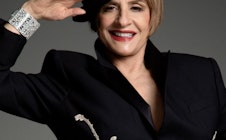




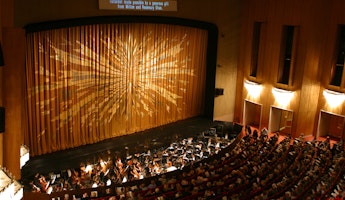

/03-cosi/_dsc0996_pr.jpg?format=auto&fit=crop&w=345&h=200&auto=format)
